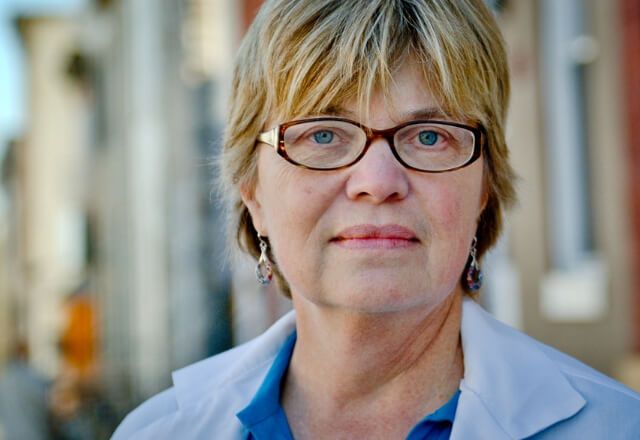Thirty Years and Counting of the Johns Hopkins HIV Women’s Health Program
Johns Hopkins Department of Gynecology & Obstetrics Looks Back
The Early Years of HIV/AIDS
In June 1981, the first case of what would become known as HIV/AIDS was reported in the United States. Men were presenting symptoms resembling pneumonia at alarming rates. As the mysterious disease spread, primarily among gay men and intravenous drug users, fear of infection followed. Without a clear understanding of how the disease was transmitted, fear of the groups affected also spread.
By 1984, when researchers had identified that HIV was transmitted through sex, from exposure to body fluids, and from mother to child during pregnancy and/or breast-feeding, nearly 1,300 of the 3,000 people diagnosed had lost their lives to AIDS.
Often overlooked at this time were women becoming infected with HIV.
Johns Hopkins Department of Gynecology & Obstetrics’ Approach
 Johns Hopkins HIV Women’s Health Program founder Jean Anderson, M.D
Johns Hopkins HIV Women’s Health Program founder Jean Anderson, M.DThe Johns Hopkins HIV Women’s Health Program was established in 1988 within the Department of Gynecology & Obstetrics to provide comprehensive reproductive health care to women with HIV/AIDS. Founder and former director Jean Anderson, M.D., and her colleagues found that women with HIV/AIDS required special care for reproductive health, including during pregnancy to prevent mother-to-child transmission. Initially funded by the Maryland State Department of Mental Health and Hygiene, and subsequently through the Ryan White HIV/AIDS Program, which was authorized by Congress in 1990, the program specializes in community-based, culturally sensitive and coordinated care to a diverse population of women living with HIV.
A Historical Look at the Johns Hopkins HIV Women’s Health Program
In the first few years of the program, roughly 100 patients received care annually. During this time, people with HIV/AIDS lacked effective treatment, and the program quickly evolved to provide social support along with the development of innovative patient care models. A buddy system was created between patients and peer counselors, most of whom were HIV-positive themselves, to help newly diagnosed patients navigate their complex disease, which at that time was uniformly fatal.
Services for patients expanded as antiretroviral drugs were developed and patients with HIV were able to live longer. Women were seen at all stages of their disease for reproductive care for cervical dysplasia, other genital tract infections, for contraceptive needs and general gynecologic care. The first antiretroviral medication, zidovudine (ZDV) or azidothymidine (AZT), revolutionized pregnancy care with a reduction in mother-to-child transmission rates by two-thirds.
In 1996, HIV treatment evolved dramatically with the introduction of a new class of antiretroviral drugs - protease inhibitors and the concept of combination therapy. Two classes of drugs used in combination to attack HIV at different points in its life cycle could more effectively treat the disease and prevent drug resistance. Currently, treatment starts almost immediately after HIV diagnosis, and with effective and lifelong treatment, HIV has become a chronic illness with the possibility of a normal lifespan.
A Transformed Approach to Women's Care
Over the last 30 years, the Johns Hopkins HIV Women’s Health Program has expanded care for women in Baltimore and the surrounding region. Since 1988, over 6,000 women have received comprehensive reproductive care and treatment, and 1,000 babies have been delivered. About 550 women are seen yearly for comprehensive reproductive care and care during pregnancy and 100 men for linkage to care or preconception counseling. Approximately 50 babies are born yearly to women in this program, and there have been no cases of mother-to-child transmission in over a decade. The program also provides community outreach, counseling and testing, and linkage/reengagement in care for newly diagnosed women and those who have fallen out of care, as well as for inmates living with HIV after release from jail or prison. HIV prevention continues to be a focus of the program, from safer sex counseling and early diagnosis and treatments of sexually transmitted infections to preconception counseling and care and Pre-Exposure Prophylaxis (PrEP). In 2019, with elimination of mother-to-child transmission of HIV within reach, and the end of the HIV epidemic within sight, the Johns Hopkins HIV Women’s Health Program is an active participant in the End the HIV Epidemic (etHE) federal initiative.
As HIV/AIDS care, treatment and prevention continue to evolve, the Johns Hopkins HIV Women’s Health Program will continue to evolve as well, but always with its cornerstone mission to provide up to date, comprehensive and coordinated reproductive health care services that are confidential and compassionate.
